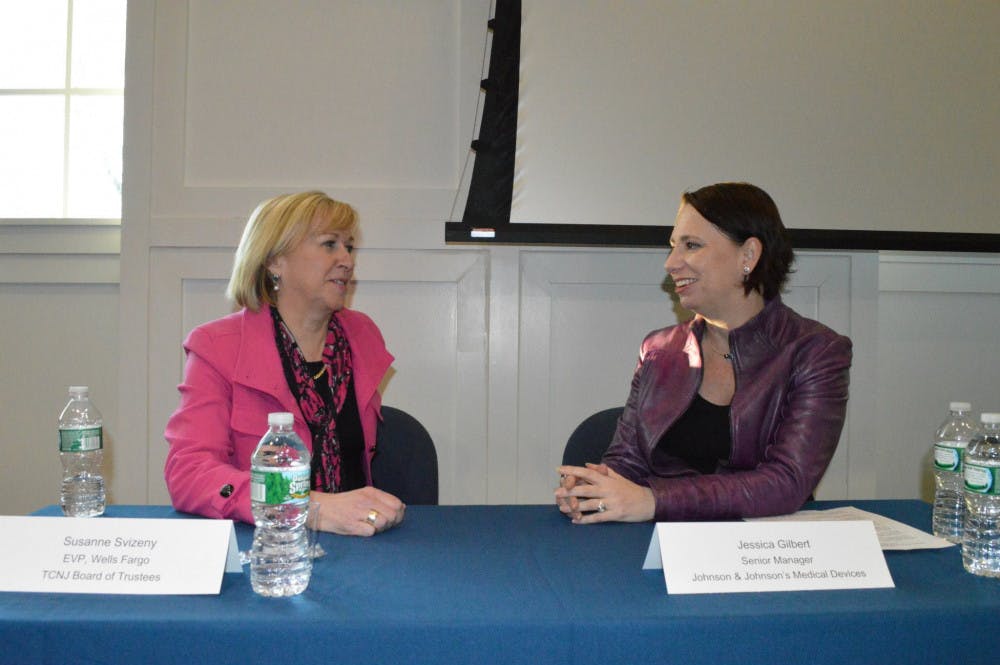By Alex Kooistra
Correspondent
Four businesswomen sat in the front of room 115 in the Education Building on Wednesday, April 1, as they led a panel on the importance of diversity in the workplace and gave tips to aspiring leaders about how they can be apart of a successful, diverse work environment.

Suzanne Svizeny, the executive vice president and commercial division manager of the Pennsylvania and Delaware divisions of Wells Fargo & Company, was the first woman to speak that night.
Svizeny, an alumna from the College who now meets with entrepreneurs who are starting or continuing businesses, has been working in this area for approximately 36 years and is well informed and passionate about the topic of diversity in the workplace.
Svizeny understands the importance of diversity because she knows what it feels like to be different from her coworkers.
“I stuck out a lot,” Svizeny said. “I was always kind of the only woman in the room.”
She never let her differences hold her back though — instead, she used them to thrive at her job.
“When I’m in the room and I’m the only female, I use that to my advantage,” Svizeny said. “It makes me stand out, and I want to stand out and be remembered.”
Rosy Bitar, the manager of fixed income funds and holdings at Bloomberg’s global data department, was the next to speak and she agreed with Svizeny’s sentiments.
“High-performing teams come from different walks of life,” Bitar said. “If we hired from the same place, everyone would have the same thoughts and ideas, and nothing unique would be created.”
Bitar, who was originally from Jordan and is fluent in Arabic, has been working at Bloomberg for 13 years and has always been working in the data department of the company.
“You have to be yourself. You have to have your own style and message,” Bitar said. “Figure out how to integrate your uniqueness into what you do and you can succeed.”
To thrive within an organization, networking is pivotal as well, which is a variable that goes hand-in-hand with diversity.
When someone networks, they will be connected to people of different walks of life. Thus, their thoughts and ideas will evolve, according to Bitar.
“Networking is one of the most crucial things no matter the organization,” Bitar said. “You will meet people of different background and make connections. We capitalize on differences in new employees and embrace them.”
Jessica Gilbert, the senior manager of global diversity and inclusion of Johnson & Johnson’s medical devices sector and global function, agreed with Bitar on the importance of networking.
“Be a joiner and go to other events to learn about diversity as a student,” Hilbert said. “The skills of connections and openness is one of the most necessary functions to succeed in an organization. Talking to different cultures is good for networking and to discover your interests and passions.”
Gilbert started as an independent consultant and has now been in this field for 25 years, helping to “create a culture where diversity, inclusion and innovation thrives.”
According to Gilbert, Johnson & Johnson is one of the most diversified companies in the world and she emphasizes that is it vital to know how diversified an organization is before joining it.
“You should always be wondering who has a perspective that I don’t understand and I need to,” Gilbert said.
One student was concerned about not knowing if a company is diversified until they become an employee and it is too late to find a new job, but Gilbert assuaged those concerns.
Gilbert explained various ways to research the diversity in a company, including looking at Diversity Inc. on the web to see if there is an office of diversity inclusion present at the desired company.
She also advised checking social media such as Twitter and LinkedIn to see if diversity and inclusion are present on their social media accounts.
Diversity is specifically important in her job because Johnson & Johnson works with drugs, which need to be tested on all different types of people. Drugs could react differently to individuals of varying genders and ethnicities.
Erika Worthy, the human resources director at the College and the final speaker at the panel, helps deal with recruitment at the College. She must focus on having a diverse pool of applicants when recruiting.
“Different employees with different backgrounds and experiences can bring different ideas and projects to the table,” Worthy said.
Worthy’s father was in the military, so she traveled frequently as a child across Europe and Asia.
“I’m blessed to have met so many different kinds of people with different kinds of backgrounds,” Worthy said.
When Worthy originally started working at the College five years ago, there was no diversity office. Since then, the Office of Institutional Diversity has been implemented.
Diversity among college campuses is of vital importance so everyone can feel included on campus no matter what their background is, according to Worthy.
“My background made me more inclusive to work with different types of people in my workplace and I’m grateful for that,” she said.
Worthy concluded by reminding students that the differences among everyone should be celebrated as opposed to criticized.
“It’s OK to have a different perspective,” she said. “Embracing other people’s differences is one of the most important parts of this culture.”







